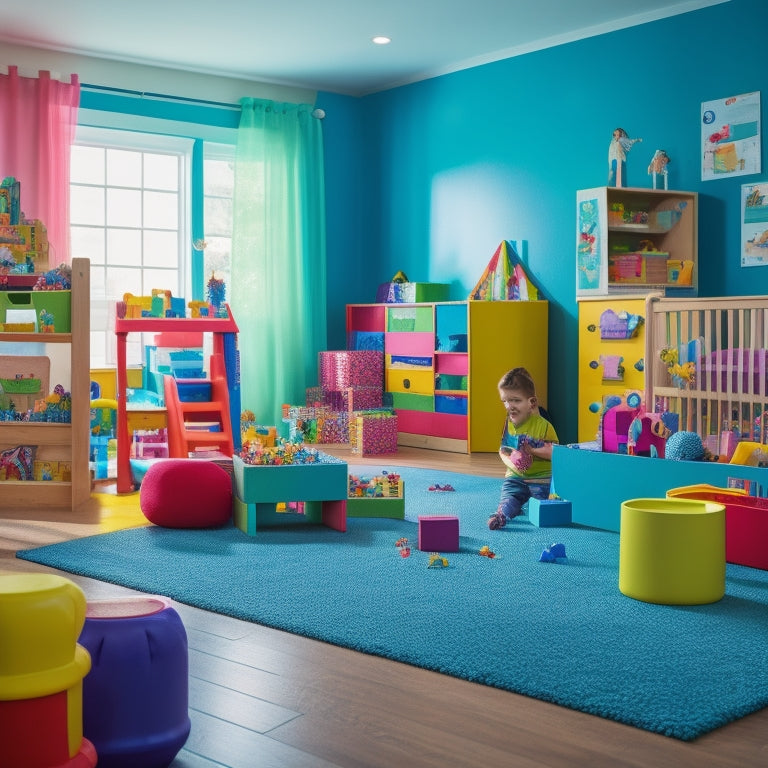
Engaging Educational Toys Boost Child Development
Share
Engaging educational toys play a crucial role in fostering cognitive, physical, and emotional development in children, laying the foundation for future academic success and lifelong learning. These toys support traditional academics, creativity, problem-solving, and critical thinking, catering to different learning styles and abilities. From infancy to early childhood, educational toys stimulate sensory exploration, hands-on activities, and interactive engagement, enhancing gross motor skills, coordination, and balance. By introducing STEM learning concepts and fostering imaginative play, they set the stage for future achievement. Explore the vast array of educational toys available, each carefully designed to reveal your child's full potential.
Key Takeaways
• Engaging educational toys aid in cognitive, physical, and emotional skill development in children.
• Toys that challenge without frustrating foster problem-solving, critical thinking, and creativity.
• Durable and multi-use toys encourage repeated engagement and skill-building in various ways.
• Play-based learning with educational toys supports interactive engagement and cognitive development.
• Educational toys lay the foundation for future academic success and lifelong learning.
Educational Toys Overview
Numerous studies have consistently shown that educational toys play an essential role in helping children learn about themselves and the world around them, while simultaneously supporting various skills and learning abilities.
The right toy selection is pivotal in fostering cognitive, physical, and emotional development in children. Educational toys aid in traditional academic skill-building, while also promoting creativity, problem-solving, and critical thinking. They are designed to cater to different learning styles and abilities, making them an indispensable tool in child development.
Qualities of Best Toys
Effective educational toys embody certain key qualities that distinguish them from mere playthings, and these characteristics are crucial for revealing a child's full potential.
A prime example is durability, ensuring that the toy withstands repeated use and remains engaging for the child.
Another crucial quality is multiple uses, allowing children to explore and learn in various ways, thereby building a range of skills.
Skill-building is an indispensable aspect of educational toys, as they should challenge children without causing frustration.
Top Toys for Young Learners
When it comes to selecting educational toys for young learners, parents and educators can choose from a wide range of engaging and developmentally appropriate options that cater to the unique needs of 2-3 year olds. These toys support play-based learning, sensory exploration, and hands-on activities, promoting interactive engagement and cognitive development.
| Toy | Description | Skills Developed |
|---|---|---|
| MentalUP | Tablet app with 150+ educational games | Problem-solving, critical thinking |
| GIGI Bloks - XXL Building Blocks | Enhances creativity and problem-solving | Fine motor, spatial awareness |
| Hony - Electronic Interactive Alphabet Wall Chart | Teaches alphabet, numbers, and more | Literacy, numeracy |
These toys are designed to promote learning through play, encouraging young learners to explore, create, and develop essential skills that will benefit them in the long run.
Exploring Additional Options
Beyond the top toys for young learners, there exist a multitude of additional educational toy options that cater to the diverse needs and interests of 2-3 year olds, offering a range of engaging and developmentally stimulating activities. These toys provide opportunities for sensory exploration, allowing children to engage their senses and develop a deeper understanding of the world around them.
For instance, Joyjoz Baby's Musical Mats stimulate musical memory while encouraging physical movement and creativity. Similarly, Melissa & Doug's Pattern Blocks and Boards foster creativity and math skills through interactive play. These additional options provide parents and caregivers with a wealth of choices to support their child's unique developmental journey.
Learning Skills and Benefits
By incorporating educational toys into their play, children can develop a wide range of essential skills that lay the foundation for future academic success and lifelong learning. These skills include:
-
Cognitive development through problem-solving and critical thinking
-
Imaginative play that fosters creativity and self-expression
-
STEM learning that introduces concepts like gravity and cause-and-effect relationships
- Gross motor skills that enhance coordination, balance, and physical development
These skills are pivotal for a child's overall development and set the stage for future academic achievements. By providing children with engaging educational toys, parents can give them a head start in life and help them develop into curious, confident, and capable individuals.
Frequently Asked Questions
How Do I Choose the Right Educational Toy for My Child's Learning Style?
When selecting an educational toy, consider your child's individual learning style, prioritizing hands-on experiences that foster sensory development and cognitive skills, such as problem-solving, to create a tailored learning environment that promotes best growth.
Can Educational Toys Really Make a Difference in Academic Performance?
Research suggests that educational toys can greatly impact academic success, as they enhance cognitive skills during playtime, fostering a strong foundation for future learning and improving overall academic performance.
Are Expensive Educational Toys More Effective Than Affordable Alternatives?
While extravagant prices may imply superior quality, the correlation between cost and effectiveness is often overstated; generic alternatives can rival branded toys in fostering cognitive development, making it essential to weigh benefits against expense.
How Long Should My Child Play With an Educational Toy Each Day?
Ideal playtime duration for educational toys varies, but 15-30 minutes per session is recommended, with parental involvement to facilitate cognitive development and maximize learning outcomes, ensuring a balance between engagement and avoidance of overwhelm.
Can Educational Toys Help Children With Special Needs or Learning Disabilities?
"Tailored to unique needs, educational toys can be a beacon of hope for children with special needs or learning disabilities, offering individualized learning, adaptation, and seamless therapy integration, while tracking progress and celebrating milestones."